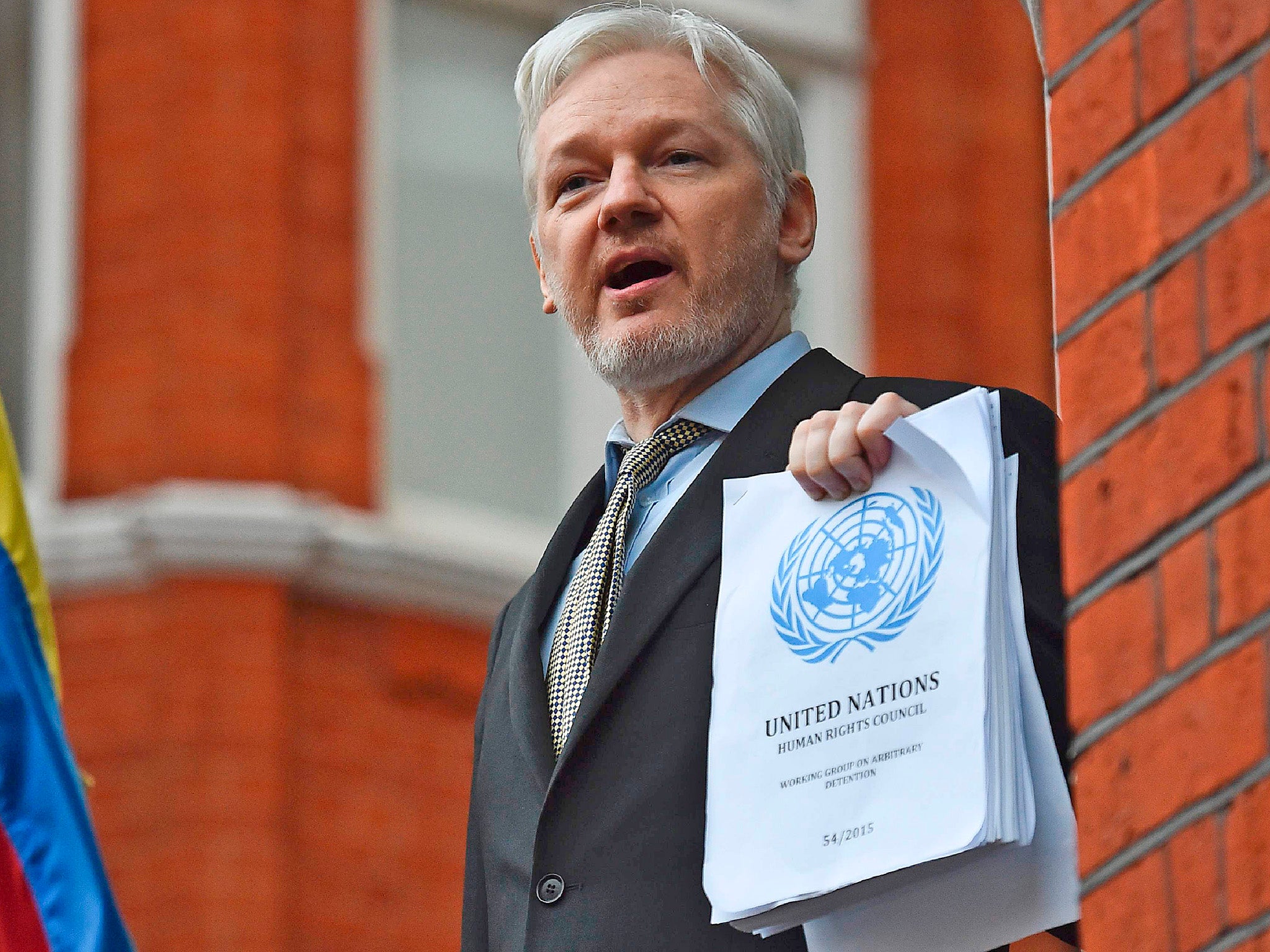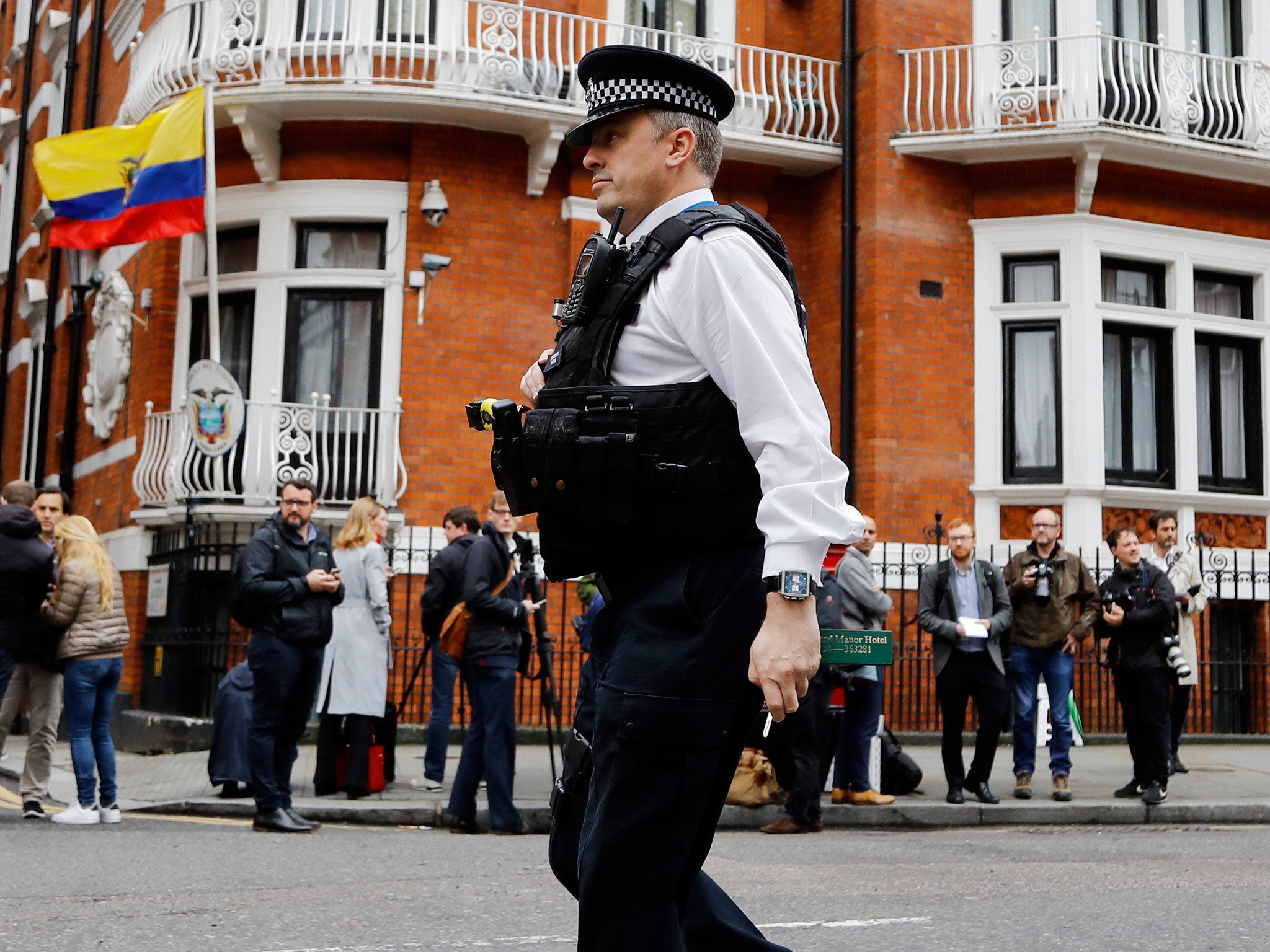Julian Assange: Sweden drops investigation against Wikileaks founder based in Ecuador's London embassy
Scotland Yard says it will still arrest Mr Assange over skipping bail if he leaves embassy

Sweden has dropped its investigation against Julian Assange but the WikiLeaks founder could still be arrested by British police.
The country's director of public prosecutions, Marianne Ny, said the preliminary rape and sexual assault probe has been discontinued because of logistical.
Mr Assange reacted to the news by tweeting a photo of himself smiling inside the Ecuadorian Embassy where he has been living for almost five years.
“Detained for 7 years without charge by while my children grew up and my name was slandered,” he wrote. “I do not forgive or forget.”

Ecuador's government launched an appeal with the British Government to give Mr Assange safe passage to be granted asylum in the South American country.
His lawyer, Per Samuelson, claimed the end of the case was a "total victory", adding: "We finally were able to get the interview done and he could describe what really happened and also because we could show that the United States is hunting him, which we could not do before.”
But the woman who accused Mr Assange of rape has said she was “shocked” by Sweden’s decision to drop the seven-year investigation.
A lawyer representing the woman, who met the WikiLeaks founder at a 2010 conference in Stockholm, said prosecutors should not have “given up the case” before it reached court and accused Mr Assange of deliberately obstructing the judicial process because he was “afraid”.
“It is a scandal that a suspected rapist can disregard the judiciary and thus avoid trial,“ Elisabeth Fritz added.
“Proof of evidence in the case is available and that evidence should have been tried in court…the wait has been long.”
The Australian activist repeatedly said he was “entirely innocent” of the allegations, which stemmed from a meeting with the claimant in August 2010.
The European arrest warrant issued for Mr Assange is being revoked, sparking speculation he would be leaving the London embassy.
But the Metropolitan Police swiftly confirmed it would still arrest the Australian over skipping bail when he sought asylum.
“Westminster Magistrates' Court issued a warrant for the arrest of Julian Assange following him failing to surrender to the court on the 29 June 2012,” a statement said.
“The Metropolitan Police Service is obliged to execute that warrant should he leave the Embassy.”
A spokesperson for WikiLeaks claimed the British government "refuses to confirm or deny" whether it has received a US extradition request, adding: "Focus now moves to UK."
The Australian activist sought asylum in the Ecuadorian Embassy while on bail in 2012, over fears the Swedish investigation would result in him being extradited to the US over leaked military documents and diplomatic cables.
The Ecuadorian government had sent Sweden a letter saying there had been a “serious failure” by the prosecutor, including a “lack of initiative” to complete inquiries.
It raised developments in the US since the election of Donald Trump as President, including a speech by CIA director Mike Pompeo describing WikiLeaks as a “hostile intelligence service”.

The letter argued that recent public declarations constituted an “obvious risk” for Mr Assange, who originally faced three sexual assault charges that he denied.
He was questioned by an Ecuadorian prosecutor with Swedish officials present inside the embassy in November, following a bilateral agreement that ended years of legal wrangling.
Prosecutors said the interview sparked further investigations but "no further measures remaining that are possible to take in order to further the investigation".
Ms Ny said the investigation could have progressed if Mr Assange was “formally served notice of the crimes of which he is suspected”, adding: “This was a measure which was to have been conducted during the interview in London but Mr Assange refused to make it possible.”
She said the probe could be reopened if Mr Assange returns to Sweden before statute of limitations ends in August 2020, but the move appears highly unlikely.
“The decision to discontinue the investigation is not because we've been able to make a full assessment of the evidence, but because we didn't see possibilities to advance the investigation,” Ms Ny added.
“So we won't make any statements on the issue of guilt."

The UN had called on Swedish and British authorities to free Mr Assange from "arbitrary detention" in a report released last year, with the UK failing to overturn the findings on appeal.
“Now that all appeals are exhausted I expect that the UK and Sweden will comply with their international obligations and set me free,” Mr Assange said following the ruling.
“It is an obvious and grotesque injustice to detain someone for six years who hasn't even been charged with an offence.”
As the Swedish investigation continued in December 2010, Mr Assange was jailed in Wandsworth Prison in isolation for 10 days and then put under house arrest for 550 days under powers granted by an international arrest warrant.
Scotland Yard stood down the 24/7 police presence outside the Ecuadorian Embassy building in 2015 but pledged to make “every effort” to arrest Mr Assange if he left.
There had been controversy over the escalating cost of the exercise, which was believed to be over £12 million.
The investigation was dropped days after Chelsea Manning, who provided WikiLeaks with classified intelligence on Iraq and Afghanistan that shocked the world, was freed from prison.
The transgender former US intelligence analyst left Fort Leavenworth on Wednesday, months after Barack Obama commuted her 35-year sentence as one of his final acts as President.
Join our commenting forum
Join thought-provoking conversations, follow other Independent readers and see their replies
Comments
Bookmark popover
Removed from bookmarks